How India is Building the World’s Largest Digital Health Ecosystem for 1.5 billion people?
Description
India’s journey in digital health began just over a decade ago, yet it has quickly grown into one of the most ambitious transformations worldwide.
It started in 2012 with maternal and child health programs, expanded to cover non-communicable diseases, and gained momentum with the launch of the Ayushman Bharat Digital Mission (ABDM) in 2020.
At the heart of ABDM is the ABHA ID—a unique 14-digit health identifier for every citizen. Combined with registries for facilities and professionals, and a consent-based health information exchange, India has laid the groundwork for a truly interoperable system.
So far, over 800 million ABHA IDs have been created. Yet, only around 20% of facilities and professionals are onboarded, with adoption challenges in the private sector.
Ritesh Aeron is a distinguished digital health expert and program management specialist with a strong track record of driving large-scale health systems transformation through digital innovation. He currently serves as a Director at the Equitable Global Healthcare Foundation (EGHF), a role he has held since April 2025. In this discussion he explains:
- What is the current state of healthcare digitalization in India?
- How did India’s digital health journey start and evolve?
- What is the Ayushman Bharat Digital Mission (ABDM) and how does it work?
- What is the ABHA ID and why is it important?
- How does interoperability and consent-based data exchange function?
- How many people and facilities are onboarded so far?
- What challenges remain in adoption and regulation?
- How is data being used for population health and surveillance?
- What role does AI and innovation play in care delivery?
- How open is the Indian market for global providers?
- How is AI affecting both healthcare delivery and the software workforce?




















